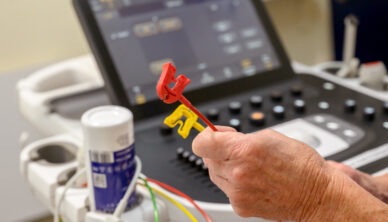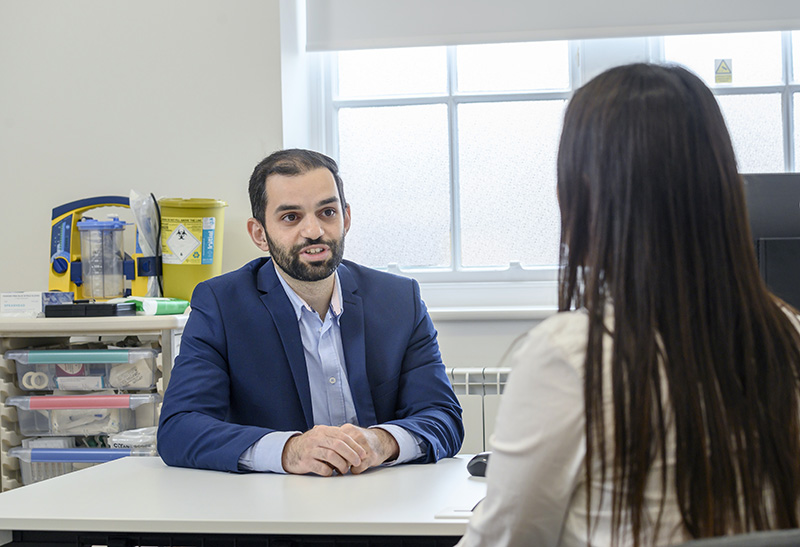Contents
Arrhythmia

An arrhythmia is an irregular heartbeat that may cause your heart to beat too fast, too slow, or with an abnormal rhythm
What is Arrhythmia?
An arrhythmia occurs when the electrical signals that control your heart’s rhythm do not function properly. This can lead to:
- Tachycardia – A fast heart rate (over 100 beats per minute)
- Bradycardia – A slow heart rate (under 60 beats per minute)
- Irregular Heartbeat – Skipped, extra, or abnormal heartbeats
While some arrhythmias are harmless, others can increase the risk of stroke, heart failure, or sudden cardiac arrest.
Signs & Symptoms
Arrhythmias may not always cause noticeable symptoms, but common signs include:
- Palpitations – A fluttering, racing, or pounding heartbeat
- Dizziness or Lightheadedness – Feeling faint or about to pass out
- Shortness of Breath – Difficulty breathing during activity or rest
- Chest Pain or Discomfort – Pressure or tightness in the chest
- Fatigue – Feeling excessively tired, even with rest
- Fainting (Syncope) – Temporary loss of consciousness due to poor blood flow
If you experience severe chest pain, fainting, or sudden difficulty breathing, seek emergency medical attention immediately.
Potential Causes & Risk Factors
Arrhythmias can be caused by several factors, including:
- Heart Disease – Coronary artery disease, heart failure, or previous heart attacks
- High Blood Pressure (Hypertension) – Puts extra strain on the heart
- Electrolyte Imbalances – Low levels of potassium, calcium, or magnesium
- Stress & Anxiety – Can trigger irregular heartbeats
- Excessive Caffeine or Alcohol – Stimulants can affect heart rhythm
- Thyroid Disorders – Overactive or underactive thyroid function
- Smoking & Drug Use – Nicotine, stimulants, and recreational drugs can cause arrhythmias
- Genetics – Family history of arrhythmias or sudden cardiac arrest
Types of Arrhythmia
There are several different types of arrhythmias, including:
- Atrial Fibrillation (AFib) – Irregular and rapid heartbeat that increases stroke risk
- Atrial Flutter – A fast but organized heart rhythm problem
- Supraventricular Tachycardia (SVT) – Episodes of fast heart rate that start in the upper chambers
- Ventricular Tachycardia (VT) – A fast, abnormal heartbeat from the lower chambers
- Ventricular Fibrillation (VFib) – A life-threatening arrhythmia requiring emergency treatment
- Bradycardia – A slow heart rate that can cause fatigue and dizziness
Diagnosis
At Royal Buckinghamshire Hospital, we use advanced cardiac tests to diagnose arrhythmias, including:
- Electrocardiogram (ECG or EKG) – A quick and painless test to measure heart activity
- Holter Monitor (24-48 Hour ECG) – Continuous heart monitoring over a day or more
- Event Recorder – A wearable device that records heart activity over weeks
- Echocardiogram – A detailed ultrasound of the heart to check for structural problems
- Stress Test (Exercise ECG) – Assessing heart rhythm during physical activity
- Electrophysiology Study (EPS) – A specialized test to map abnormal electrical signals in the heart
Treatment Options
Managing high blood prTreatment for arrhythmia depends on the type and severity of the condition. Options include:
Lifestyle Changes & Monitoring
- Reducing Stress – Meditation, yoga, and breathing exercises
- Avoiding Stimulants – Cutting back on caffeine, alcohol, and smoking
- Heart-Healthy Diet – Low sodium, high-fiber, and balanced nutrition
- Regular Exercise – Keeping the heart strong while avoiding overexertion
Medications for Arrhythmia
- Antiarrhythmic Drugs – Help regulate heart rhythm
- Beta-Blockers – Reduce heart rate and blood pressure
- Blood Thinners (Anticoagulants) – Reduce the risk of stroke in AFib patients
Medical Procedures
- Cardioversion – Electrical shock therapy to restore normal rhythm
- Catheter Ablation – A minimally invasive procedure to destroy abnormal heart tissue
- Pacemaker Implantation – A small device to regulate slow heartbeats
- Implantable Cardioverter Defibrillator (ICD) – A device for high-risk patients to prevent sudden cardiac arrest
Monitoring and Long Term Management
Managing coronary artery disease requires regular check-ups and ongoing care. At The Royal Buckinghamshire Hospital, we Patients with arrhythmia require ongoing monitoring to prevent complications. At Royal Buckinghamshire Hospital, we offer:
- Regular ECGs & Holter Monitoring – Tracking heart rhythm changes
- Medication Adjustments – Ensuring the most effective treatment plan
- Cardiac Check-Ups – Routine heart health assessments
- Stroke Prevention Programs – Managing AFib-related stroke risks
Early detection and treatment of arrhythmia can significantly improve heart health and quality of life.
Arranging To Visit A Private GP

At Royal Buckinghamshire Hospital, we provide fast diagnosis, expert treatment, and ongoing care to support recovery and reduce future risk. Make an appointment with one of our private GPs who can refer you to our specialist cardiologist. Appointments are available to everyone and can often be booked for the same day. There is no need to be registered with our The Royal Buckinghamshire Hospital, or live locally.
If you have insurance which covers a GP visit, we can in most cases invoice the insurer directly. Where you are paying directly, the cost for a 30 minute consultation is £100.
Any additional costs will always be discussed. They could apply if you are referred for an MRI scan, or to a consultant, or for other agreed decisions to support your health.
Our Resident Private GP
Dr Chamali is welcoming and highly experienced. He offers his patients sound diagnosis and treatment, along with individual care focused on their future health.
31 March 2025




